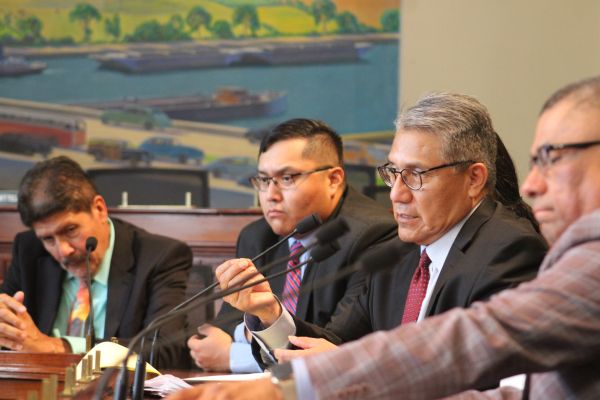
- Details
- By Native News Online Staff
Leaders of the Native American Church are preparing for another lobbying effort on Capitol Hill to protect the habitat of peyote and are calling on Tribes for their support.
The Native American Church of North America (NACNA) began taking its efforts to protect the habitat of peyote last year, and are strengthening their efforts to protect the plant’s habitat before climate change and private landowners eradicate the plant.
“NACNA is advancing administrative and legislative efforts to the executive branch and U.S. Congress for the conservation of peyote’s habitat,” NACNA President Jon Brady told Native News Online. “We are seeking to conserve and protect peyote and are seeking federal appropriations for a demonstration project for private lands in Texas. We, as NACNA, can only do so much and we need Tribal leader support to continue our efforts across the finish line.”
NACNA, which has more than 300,000 members and is the largest inter-tribal faith organization in North America, is requesting $5 million in federal funding for a new program to be established either by the USDA’s existing Conservation Reserve Program or as a stand-alone grant program to be administered by the Department of the Interior’s Office of the Assistant Secretary–Indian Affairs.
The program would compensate private land owners for agreeing to convert their lands into a protected peyote habitat and would fund activities that focus on the conservation and managed harvest of peyote.
In the United States, peyote grows on private lands. NACNA leaders worry that in addition to climate change, if the regulations around peyote change, wide-scale personal and corporate cultivation of peyote will threaten the historical and biological integrity of the plant. If not grown in its natural environment, it exposes the population to hybridization, genetic medication, and sterilization—all are in violation of federal law regarding restrictions on peyote.
The Northern Arapaho Business Council, the Fort Hall Business Council, the Three Affiliated Tribes, the Oglala Sioux Tribe, the Chippewa Cree Tribe of Rocky Boy Montana, and the Native American Church of North America-State Of New Mexico have all passed resolutions supporting the preservation of peyote sites.
The Northern Arapaho Business Councilman Keenan Groesbeck wrote a letter to Senator John Barasso (R-WY) on May 3, 2023, asking for support.
“The protection of peyote habitat falls within the United States' trust and treaty obligations to American Indians and Alaska Natives and is in alignment with the provisions of the American Indian Religious Freedom Act of 1978 and the Peyote Amendments of 1994. We sincerely hope that you will fight with the Tribe to protect natural peyote habitats and guarantee tribal citizens the ability to practice their religion in perpetuity.”
Meetings are scheduled Sept. 19-21, at the National Indian Gaming Association’s Conference Center and will include presentations from National Congress of American Indians Executive Director Larry Wright, NACNA leadership, attorneys specializing in federal Indian law, and more. For more information, visit NACNA’s Facebook.
More Stories Like This
NCAI Passes Two Emergency Resolutions on Immigration Enforcement ActivitiesChickasaw Lighthorse Police Officer named Indian Country Law Enforcement Officer of the Year
Indian Gaming Association Rallies Broad Coalition Against Sports Event Contracts It Calls Illegal Threat to Tribal Sovereignty
Navajo Resources and Development Committee Issues Notice on Livestock Inspection Requirements
American Prairie, Tribal Coalition Files Protest Over Rescinded Grazing Rights
Help us defend tribal sovereignty.
At Native News Online, our mission is rooted in telling the stories that strengthen sovereignty and uplift Indigenous voices — not just at year’s end, but every single day.
Because of your generosity last year, we were able to keep our reporters on the ground in tribal communities, at national gatherings and in the halls of Congress — covering the issues that matter most to Indian Country: sovereignty, culture, education, health and economic opportunity.
That support sustained us through a tough year in 2025. Now, as we look to the year ahead, we need your help right now to ensure warrior journalism remains strong — reporting that defends tribal sovereignty, amplifies Native truth, and holds power accountable.
 The stakes couldn't be higher. Your support keeps Native voices heard, Native stories told and Native sovereignty defended.
The stakes couldn't be higher. Your support keeps Native voices heard, Native stories told and Native sovereignty defended.
Stand with Warrior Journalism today.
Levi Rickert (Potawatomi), Editor & Publisher


